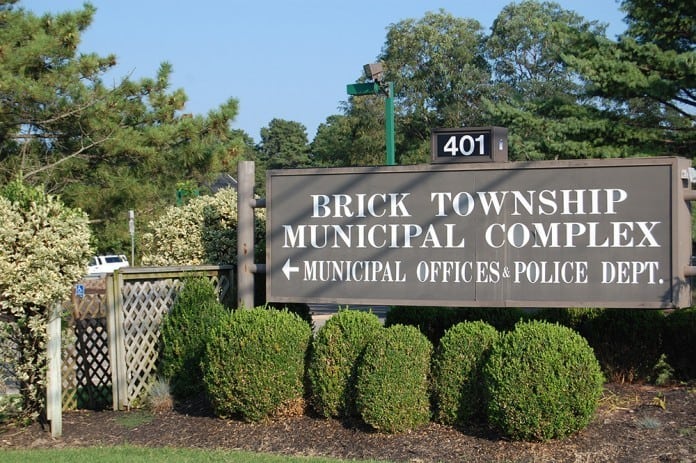
BRICK – The township has joined other governing bodies in New Jersey such as Bay Head, Middletown, and the County of Ocean in passing a resolution opposing New Jersey becoming a sanctuary state. The resolution also states that Brick would never become a sanctuary city.
The resolution also supports a recent action by the Ocean County Board of Chosen Freeholders to pursue a federal lawsuit challenging the State Attorney General’s directive that seeks to limit the continued cooperation by the Ocean County Sheriff’s Department with the Federal Immigration and Customs Enforcement Agency (ICE).
“It’s a directive from the Attorney General to limit the cooperation with ICE officials, and I want to thank the Freeholders for saving the taxpayers of Brick the money to fund the lawsuit,” said Mayor John G. Ducey during a recent council meeting.
“They’re fighting at the next level up for all of our towns in Ocean County, and it’s a great job of conserving funds of our towns and not making each individual town file their own lawsuit,” Ducey said.
“I’m glad you’re backing me, mayor,” said Councilman Jim Fozman, who said that the council had “rejected” his resolution when he proposed it during the July 23 council meeting. The resolution was not on the agenda.
Fozman, who is the lone Republican on council, has frequently been at odds with the governing body since he switched parties in August of 2018.
Ducey said the way Fozman proposed the resolution was disturbing to him as a mayor.
“It’s hard to believe that this person has been on council for seven and a half years and doesn’t know how to put something on the agenda the proper way,” Ducey said.
He said Fozman blindsided the council and residents of Brick by “trying to throw something on the agenda at the last minute…you don’t get to show up on the council meeting night and say ‘put this on the agenda now.’”
Ducey said Brick would never be a sanctuary town as long as he is mayor. That policy has been in effect since 2017 before Governor Murphy was ever in office, he added.
Fozman said he felt some satisfaction that the mayor had “partially patronized my resolution to what I originally proposed two weeks ago,” but said the resolution fell short of the one he proposed on July 23.
“You failed to reject the Attorney General’s directive that our local police not to cooperate with ICE agents; in fact, your resolution purposely omits that detail,” Fozman said.
Fozman made a motion to amend the resolution to include instructions for the police chief to ignore the Attorney General’s Gurbir S. Grewal’s directive and to continue to cooperate with ICE agents.
He also made a motion to remove the resolution from the agenda for further discussion. Neither of his motions received a second from other council members.
Council President Andrea Zapcic asked council attorney Scott Kenneally if it was necessary to add additional information to the resolution.
“I don’t believe it’s necessary,” Kenneally said. “The resolution that was presented to the council is very similar to the resolution adopted by Middletown, Jackson, Bay Head, Ocean County – all of which ask the Attorney General to reconsider, review and repeal the Attorney General guidelines, but they don’t direct our police department to not comply with the law.”
Mayor Ducey said the policy is that Brick is not a sanctuary town and will never be a sanctuary town.
“I’ve checked with the police chief a number of times, and he’s assured me nothing at all has changed before the directive or after the directive,” the mayor said.
“He’s maintaining his police force the way he feels will make his people and our residents safe, and it’s not a sanctuary town.”
Council President Andrea Zapcic asked Kinneally if it is correct that the council does not have the authority to direct the police chief by resolution. The attorney said that is correct, that only the mayor has that authority.
The State Attorney General’s office, when reached for comment by this newspaper when the Freeholders initially decided on a lawsuit, stated that there is nothing in the Directive that says the county cannot continue working with ICE in the way that it has been.
“Nothing in the Directive restricts officers from complying with the requirements of
federal law, including 8 U.S.C. § 1373,” read a statement from Peter Aseltine, spokesman for the Attorney General’s office.
Grewal spoke in Lakewood earlier this year about the reasons behind the Directive.
“There exists today a culture of fear,” Grewal said at the time. “Crimes go unreported and justice goes unserved. We don’t want people to fear the badge.”
But anyone found guilty of a crime in the state will pay the price, he said.
“If you commit a crime in New Jersey, regardless of your immigration status, you will still go to jail,” Grewal said. “We will still work with ICE Immigration and Customs Enforcement.”
The directive is can be viewed here: nj.gov/oag/dcj/agguide/directives/ag-directive-2018-6.pdf
Basically, the directive states that local law enforcement shouldn’t be asking about residency or helping ICE just for the purposes of immigration enforcement. They must work with ICE, however, for violent or sexual crimes such as:
- Any first or second degree offense, as defined in N.J.S.A 2C:43-1;
- Any indictable domestic violence offense defined in N.J.S.A. 2C:25-19;
- A list of other crimes such as assault, endangering the welfare of children, burglary, witness tampering, eluding, stalking, and more.
Dam Repairs Planned
During the council meeting the governing body voted to award a bid to Capela Construction Inc. of Sicklerville NJ for $177,820 for repairs to the upper Lake Riviera – Rainbow Dam Culvert replacement and embankment restoration.
The water in Lake Riviera has been lowered in order to make repairs after a required dam inspection was completed. During the inspection, the engineering staff observed sediment on top of the pipe and confirmed the bottom of the pipe was rotted out, said Mayor Ducey during the meeting.

The NJ DEP Dam Safety Bureau conducted a site visit and mandated that the lake be lowered in order to make the repairs. As a class 2 dam, there is a high risk for damage to property if the dam fails, so it had to be lowered immediately, Ducey said.
Chris Lundy and Patricia A. Miller contributed to this story






